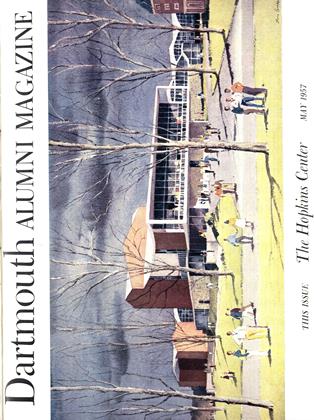Calvin Coolidge, the Vermonter, once said, "Radical ideas have been tried time and time again, and have always been found to fail." Lying in close juxtaposition to Vermont, the College is understandably tentative in its approach to newfangled notions. No stainless steel trains ply the Connecticut and Passumpsic Division of the B & M; no helicopters whisk golfers to Hilton Field; local sales of No-Doz still exceed those of Miltown, and the deskless executive is unknown. Nevertheless, the College and Village are not totally impervious to the assaults of progress. Spring water, via the "aqueduct," no longer drips in local sinks; an IBM installation is now assigning class sections and recording the grades of exams - written with electric pencils; many of our carbon filament lamps have been replaced with Mazdas; and even prospective College architecture is feeling the hot breath of modernness.
The latest local concession to technocracy occurred at 07:52 on April 4th - D-day, when the College telephone exchange was cut over to a dial system. Almost ten years ago we celebrated, in this column, the installation of a new PBX with two and a half girls at the switchboard and a marked improvement in service. But, increasingly, intramural communication had become vexatious; the half girl tired easily; and for some mysterious electronic reason, WDBS programs leaked onto the wires so that one could hear "The Moonlight Gambler" through twice before his call was acknowledged. Now all that is changed, after many months of jolly work by Tel. & Tel. operatives delving into the bowels of the earth through holes in the street or perched in cozy canvas shelters high on utility poles. Genial young men driving green wagons and armed with longnosed pliers have been around our offices, jimmying with hundreds of little filaments wrapped in silken threads more vari-colored than our jumbo set of Crayolas.
Deep in the Hanover Inn's cellars, in the confines of what once was the help's dining room and is still redolent of hash and heeltaps, is a complicated installation of jigglety gimmicks that we would hate to be left alone with. Upstairs, the two and a half girls are still on the job, but the hotel switchboard is divorced from that of the College, and the girls have more trunks to play with than a whole parade of circus elephants - numberless direct outlets to the Hanover exchange, the hospital, and the long-distance center in White River. The College extensions run from 201 (Great Issues) to 598 (Professor Williams), and numbers ending in double o are no longer a distinction, but rather a pest. The easiest number to dial is 211 (Microbiology), but our favorite is 206 (Animal House) which we call frequently to chat with a sheep. Everyone of professorial grade, and a lot of others, has his separate phone and number. The only exception is the Physics Department which, apparently unable to cope with complicated electronics, can be reached only by dialing the Operator and letting her worry about it.
It was lots of fun the first day, calling up people we hadn't spoken with for years just to see if it would work. Some bugs, naturally, developed, as when the technicians hooked up a beige instead of an ecru covered wire to a terminal, but the Bell System entomologists have been busy as bees, and things are pretty much un-FU. The chief remaining cause of snarls is the inability of certain academic minds to appreciate that numbers have been universally re-assigned. This requires the consultation of a new directory which is admittedly an awkward bit, eleven inches high and unfolding to a length of 1.18 cubits, or nearly a third of a fathom. Our temporary plaint is that our own new number is the one formerly enjoyed by "Buildings and Grounds," with the result that every few minutes we get a call beginning, "Jim! Our refrigerator is on the blink again." But not so bad as the head football coach whose incoming calls, by virtue of a misprint, are currently being received at the Circulation Desk of the Library — an excess of de-em-phasis that perhaps even the Ivy Presidents did not contemplate.
Inter-office chit-chat aside, the greatest boon of our dial system is the possibility of calling the Hanover exchange direct, to get through to the home front. Dial "o" for Operator; dial "9" for the Hanover exchange; "8" for the Hospital; "7" to ask for Aces; and "6" - but this is also "M," so we don't often ask for Kings.
 View Full Issue
View Full Issue
More From This Issue
-
 Feature
FeatureExciting Theater Ahead
May 1957 By WARNER BENTLEY -
 Feature
Feature"An Open-Arms Aspect ..."
May 1957 By ANN HOPKINS POTTER -
 Feature
FeatureThe Man Who Designed the Center
May 1957 By ROBERT L. ALLEN '45 -
 Feature
FeatureDramatics
May 1957 By PROF. HENRY B. WILLIAMS -
 Feature
FeatureA New Dimension in Dartmouth Education
May 1957 -
 Feature
FeatureA Stimulus to Town Development
May 1957 By PROF. HUGH S. MORRISON '26,
BILL McCARTER '19
-
 Article
ArticleThe Hanover Scene
November 1952 By BILL McCARTER '19 -
 Article
ArticleThe Hanover Scene
May 1953 By BILL McCARTER '19 -
 Article
ArticleThe Hanover Scene
June 1956 By BILL McCARTER '19 -
 Article
ArticleThe Hanover Scene
April 1957 By BILL McCARTER '19 -
 Article
ArticleThe Hanover Scene
October 1951 By BILL McCARTER '19 -
 Article
ArticleTHE HANOVER SCENE
FEBRUARY 1959 By BILL MCCARTER '19







